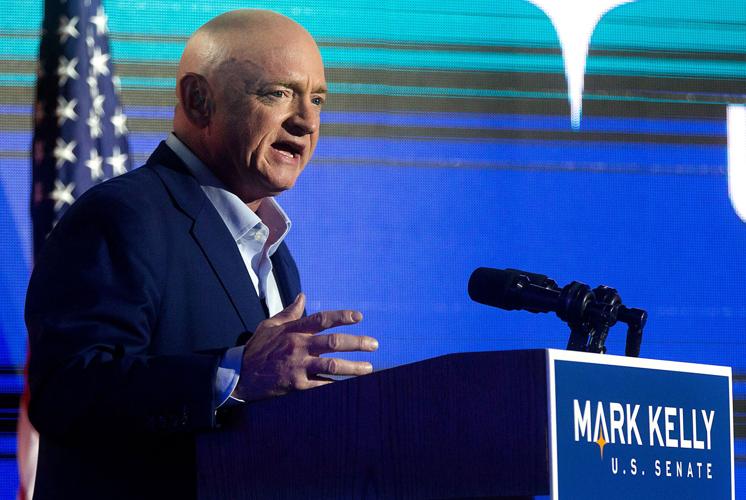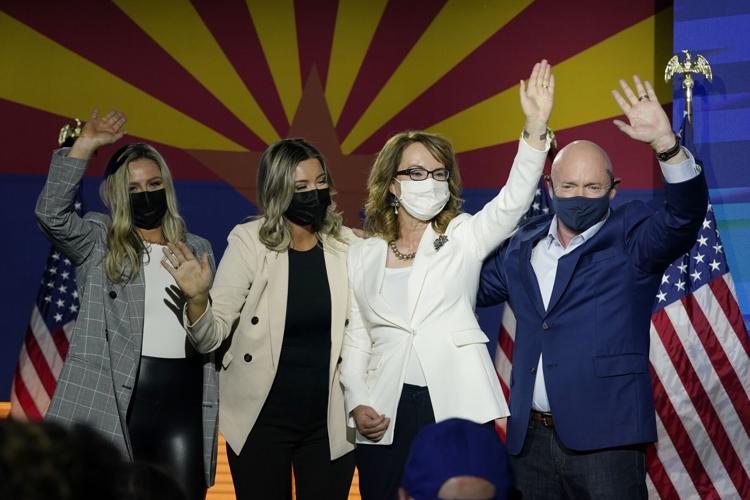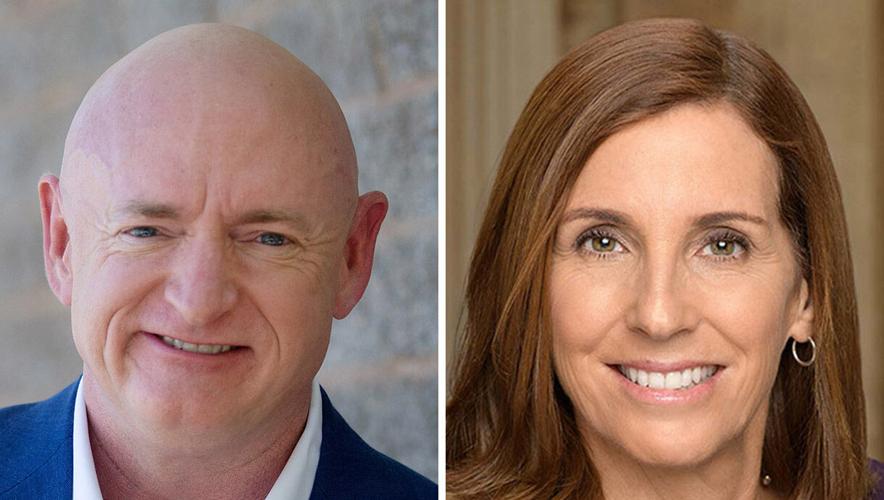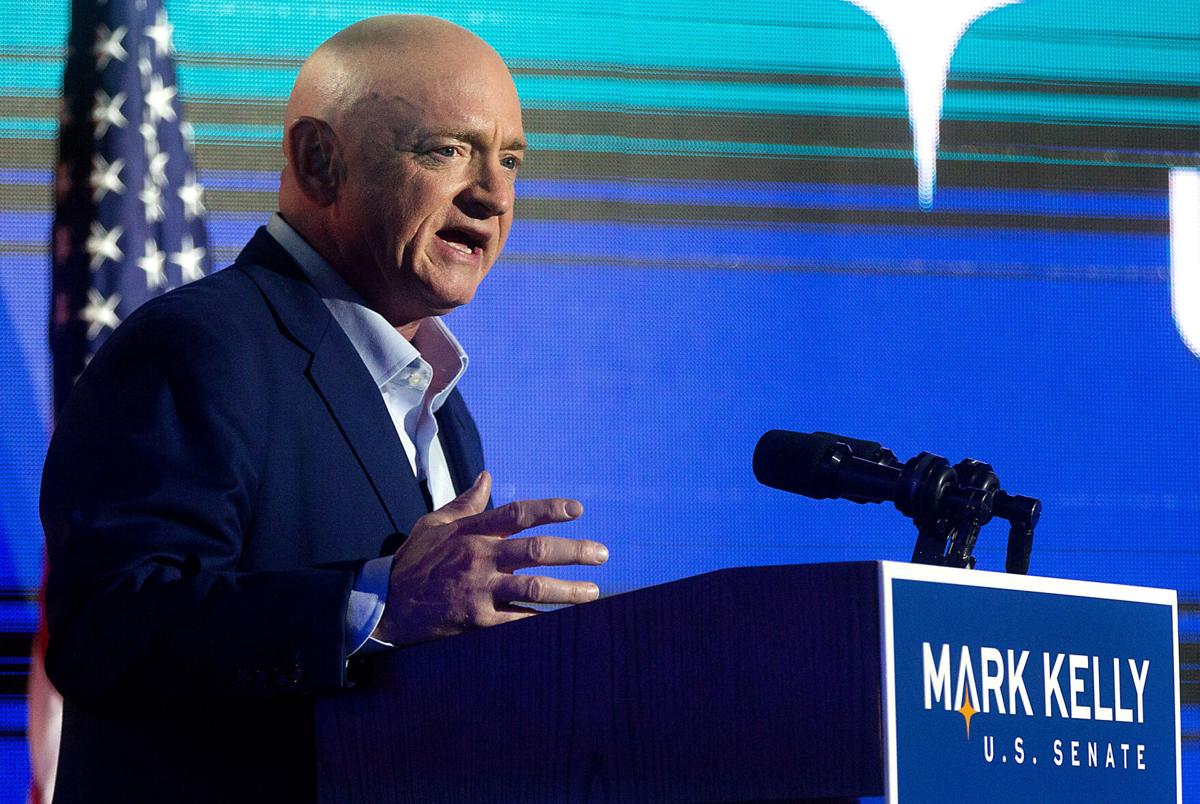Arizona is poised to send two Democrats to the U.S. Senate for the first time in 67 years.
At just before 1 a.m. Wednesday morning, the Associated Press declared former combat pilot and astronaut Mark Kelly as the winner over incumbent Republican Sen. Martha McSally in the race to finish the final term of the late John McCain.
Kelly was leading with 53.4% of the more than 2.6 million votes counted when AP called the race, according to the Arizona Secretary of State's website.
The closely watched and historically expensive Arizona race was expected to help decide which party controls the U.S. Senate, but Democrats' hopes of flipping the chamber were fading Wednesday.
Kelly and McSally were vying for the right to serve out McCain’s last term, which runs through January 2023.
LATEST: Live 2020 election results from Arizona, Pima County
Gov. Doug Ducey appointed McSally to the seat after McCain’s death in 2018.
At just before 10 p.m., with the result still in question, Kelly addressed supporters at Hotel Congress in downtown Tucson, the same spot where he launched his campaign in February 2019.

Candidates for U.S. Senate, Arizona: Mark Kelly, left, and Martha McSally
It sounded like a victory speech, though he stopped just short of declaring victory.
“I’m confident that when the votes are counted we’re going to be successful in this mission,” Kelly said. “This is not about celebrating. This is about getting to work.”
He went on to thank his wife, former Congresswoman Gabby Giffords, his daughters and his twin brother and fellow astronaut, Scott Kelly. He also thanked campaign staff, volunteers, supporters and donors, before launching into a stump speech of sorts that lasted about 15 minutes.

Mark Kelly, right, Arizona Democratic candidate for U.S. Senate, waves to supporters along with his wife Gabrielle Giffords, second from right, and daughters, Claire Kelly, left, and Claudia Kelly, second from left, during an election night event Tuesday, Nov. 3, 2020 in Tucson.
McSally campaign spokeswoman Caroline Anderegg pushed back on AP's decision to call the race in a statement issued at 1:27 a.m. Wednesday.
“Hundreds of thousands of votes have still not been counted," Anderegg said. "Every Arizonan deserves to have their voice heard and vote counted. We continue to monitor returns. The voters of Arizona decide this election, not media outlets.”
If AP's projection holds up, Kelly could join fellow Democrat Kyrsten Sinema in the Senate before the end of the year, under federal rules that call for a mid-term election winner to be seated as soon as the election results are certified in Arizona on Nov. 30.
McSally, meanwhile, will have lost to both Arizona senators — first to Sinema in 2018 and now to Kelly.
Sinema congratulated Kelly and took a veiled swipe at McSally in a written statement she issued just after 8 a.m. Wednesday.
“Continuing a long tradition, Arizonans again chose independent leadership in electing our new U.S. Senator,” Sinema said. “I congratulate Mark on his victory and on the campaign he ran — a campaign focused on the issues that matter to Arizonans and how to get results for our state, rejecting the petty politics of name-calling and false personal attacks.”
Sinema said she looks forward to partnering with Kelly to “cut through Washington dysfunction." She finished by thanking McSally “for her service.”
This will mark just the fourth time since statehood — and the first time since Barry Goldwater replaced Ernest McFarland in 1953 — that both of Arizona’s senators have been Democrats.
Kelly led McSally in the polls and in fundraising throughout the campaign, though neither candidate struggled to bring in donations.
The two candidates from Tucson consistently ranked among the nation’s top fundraisers, resulting in what easily ranks as the most expensive political campaign in Arizona history.
The previous record holder was the McSally-Sinema race in 2018, which saw the two candidates combined to spend about $45 million.
This time around, McSally spent $47.6 million all by herself, while Kelly burned through an eye-popping $77.9 million, according to the nonpartisan Center for Responsive Politics.
A look at the swing states that have been a point of focus for both political parties. The 2016 election was a surprise when pollsters thought Hillary Clinton was going to win. Will the 2020 election be just as unpredictable?
Their combined total of $125.5 million was second highest in the nation behind the $164 million spent in South Carolina by Republican Sen. Lindsey Graham and Democratic challenger Jaime Harrison.
And that doesn’t even count the tens of millions of dollars in outside money that poured into Arizona, as partisan groups wrestled for majority control of the Senate.
With her apparent defeat, McSally has made some unwelcome Arizona history, becoming the first major-party candidate to run for and lose both of the state’s U.S. Senate seats in back-to-back elections.
As it turns out, she may have been bucking the odds from the start. According to the national political website FiveThirtyEight, McSally was the just 12th Republican or Democrat since 1984 to run in a general election for Senate two years after losing in one. Only four of those candidates were victorious on the second try.
Photos: 2020 General Election in Pima County and Arizona
Ballot processing in Pima County
Updated
An election worker stacks ballots to be processed at the Pima County Elections Center, Tucson, Ariz., November 5, 2020.
Ballot processing in Pima County
Updated
An election worker prepares ballots to be fed into her machine as ballot processing continues at the Pima County Elections Center, Tucson, Ariz., November 5, 2020.
Ballot processing in Pima County
Updated
Workers process ballots as the count goes on at the Pima County Elections Center, Tucson, Ariz., November 5, 2020.
Ballot processing in Pima County
Updated
An election worker looks over some ballots being processed at the Pima County Elections Center, Tucson, Ariz., November 5, 2020.
Ballot processing in PIma County
Updated
Election workers continue their work in preparing ballots in order for them to be counted later in the day the Pima County Elections Center on November 5, 2020. Photo by Mamta Popat / Arizona Daily Star
Ballot processing in PIma County
Updated
Deputy Scott Woodworth, left, and Deputy Andrew Conrad of the Pima County Sheriff's Department stand outside of the Pima County Elections Center on November 5, 2020. Due to some gatherings around the country at election offices, deputies are on site to help keep the peace. Photo by Mamta Popat / Arizona Daily Star
Ballot processing in PIma County
Updated
Election workers continue their work in preparing ballots in order for them to be counted later in the day the Pima County Elections Center on November 5, 2020.
Ballot processing in PIma County
Updated
Adrian Gomez, an election worker, feeds ballots into a machine which opens the envelopes automatically in preparation for them to be counted later in the day at the Pima County Elections Center on November 5, 2020. Photo by Mamta Popat / Arizona Daily Star
Ballot processing, Pima County
Updated
An election worker calls a voter to confirm a signature on a ballot at the Pima County Elections Office located at 6550 S Country Club Rd, on Nov. 4, 2020.
Ballot processing, Pima County
Updated
An election worker scans a ballot while doing the first check of the signature while processing ballots at the Pima County Elections Office located at 6550 S Country Club Rd, on Nov. 4, 2020. If the signature matches what the office has on file the ballot will move on to be counted. If the signature does not match it will be moved to a special desk where workers investigate the signature by following up with the voter.
Ballot processing, Pima County
Updated
An election worker scans a ballot while doing the first check of the signature while processing ballots at the Pima County Elections Office located at 6550 S Country Club Rd, on Nov. 4, 2020. If the signature matches what the office has on file the ballot will move on to be counted. If the signature does not match it will be moved to a special desk where workers investigate the signature by following up with the voter.
Election Day, Pima County and Arizona, 2020
Updated
Mark Kelly, right, Democratic candidate for U.S. Senate, waves to supporters along with his wife Gabrielle Giffords, second from right, and daughters, Claire Kelly, far left, and Claudia Kelly, second from left, during an Election Night watch party on November. 3, 2020 at Hotel Congress in downtown Tucson, Ariz.
Election Day, Pima County and Arizona, 2020
Updated
The crowd gathers in St. Philip's Plaza for a Republican supporters party on election night, Tucson, Ariz., November 3, 2020.
Election Day, Pima County and Arizona, 2020
Updated
Election night wears on as Republican supporters stay up late waiting for numbers at a party held at St. Philip's Plaza, Tucson, Ariz., November 3, 2020.
Election Day, Pima County and Arizona, 2020
Updated
Fox News declares Joe Biden the winner over Donald Trump in the state of Arizona behind the night's entertainment, singer Buck Helton, at a Republican supporters' party at St. Philip's Plaza, Tucson, Ariz., November 3, 2020.
Election 2020 Senate Kelly
Updated
Mark Kelly, Democratic candidate for U.S. Senate, speaks during an Election Night gathering at Hotel Congress in downtown Tucson, Ariz. on November 3, 2020.
Election 2020 Senate Kelly
Updated
Mark Kelly, right, Arizona Democratic candidate for U.S. Senate, waves to supporters along with his wife Gabrielle Giffords, second from right, and daughters, Claire Kelly, left, and Claudia Kelly, second from left, during an election night event Tuesday, Nov. 3, 2020 in Tucson, Ariz. (AP Photo/Ross D. Franklin)
Election Day, Pima County and Arizona, 2020
Updated
District 10 senate candidate Justine Wadsack moves through the crowd at a Republican supporters party at St. Philip's Plaza, Tucson, Ariz., November 3, 2020.
Election Day, Pima County and Arizona, 2020
Updated
Arizona house candidate Brendan Lyons speaks to the Republican party supporters gathered at St. Philip's Plaza, Tucson, Ariz., November 3, 2020.
Election Day, Pima County and Arizona, 2020
Updated
Gabby Saucedo Mercer, candidate for Pima County Board of Supervisors, watches polling numbers roll in at a Republican supporters party at St. Philip's Plaza, Tucson, Ariz., November 3, 2020.
Election Day, Pima County and Arizona, 2020
Updated
A woman in the crowd reacts as the first numbers of the night come up on network news showing Joe Biden well ahead of Donald Trump in Arizona during a party for Republican supporters at St. Philip's Plaza, Tucson, Ariz., November 3, 2020.
Election Day, Pima County and Arizona, 2020
Updated
The crowd of Republican supporters celebrate as news organizations declare Texas for Donald Trump during an election party at St. Philip's Plaza, Tucson, Ariz., November 3, 2020.
Election Day, Pima County and Arizona, 2020
Updated
Mark Kelly, Democratic candidate for U.S. Senate, speaks during an Election Night gathering at Hotel Congress in downtown Tucson, Ariz. on November 3, 2020.
Election Day, Pima County and Arizona, 2020
Updated
President Trump supporters wave a flag during an election watch party, Tuesday, Nov. 3, 2020, in Chandler, Ariz. (AP Photo/Matt York)
Election Day, Pima County and Arizona, 2020
Updated
Maria Miranda waves to drivers as she waves her sign while stumping for 2nd Congressional candidate Brandon Martin outside the polling site at Desert Gardens Presbyterian Church, 10851 E Old Spanish Trail, Tucson, Ariz., November 3, 2020.
Election Day, Pima County and Arizona, 2020
Updated
Voters wait in line to cast their ballots at Gideon Missionary Baptist Church, 3085 S. Campbell Ave., in Tucson, Ariz. on Nov. 3, 2020.
Election 2020 Arizona Voting
Updated
A poll worker wearing a face shield and mask checks outside for voters in need of assistance at the polling station at Tucson Arizona Boys Chorus, 5770 E. Pima St., in Tucson, Ariz. on Nov. 3, 2020.
Election 2020 Arizona Voting
Updated
A short line forms outside of the Drexel Heights Community Center, 5220 S San Joaquin Ave., polling place on November 3, 2020.
Election 2020 Arizona Voting
Updated
A voter glances at voting signs while approaching the Donna R. Liggins Neighborhood Center polling place located at 2160 N 6th Avenue, on Nov. 3, 2020.
Election Day, Pima County and Arizona, 2020
Updated
Poll volunteers work the final half hour of the night at the Dusenberry-River Branch Library, one of the voting sites in Tucson, Ariz., November 3, 2020.
Election Day, Pima County and Arizona, 2020
Updated
Election Protection Arizona's Chris Griffin sits just outside the exclusion area at the Christ Lutheran Vail Church polling site, Vail, Ariz., November 3, 2020.
Election Day, Pima County and Arizona, 2020
Updated
Voters file into the polling site at Christ Lutheran Vail Church, 14600 E. Colossal Cave Rd., as voting takes place across the nation, Vail, Ariz., November 3, 2020.
Election Day, Pima County and Arizona, 2020
Updated
A poll worker gestures a couple of voters inside the Desert Gardens Presbyterian Church, 10851 E Old Spanish Trail, one of polling sites across the area, Tucson, Ariz., November 3, 2020.
Election 2020 Arizona Voting
Updated
Trump supporters greet another arriving Trump supporter arriving outside of the Living Word Bible Church voting station in Phoenix, Ariz., on Election Day, Tuesday, Nov. 3, 2020. (AP Photo/Dario Lopez-MIlls)
Election 2020 Arizona Voting
Updated
Trump supporters greet voters arriving in their cars at the Living Word Bible Church voting station in Phoenix, Ariz., on Election Day, Tuesday, Nov. 3, 2020. (AP Photo/Dario Lopez-MIlls)
Election Day, Pima County and Arizona, 2020
Updated
A line forms outside the polls at Continental Ranch Community Center located at 8881 N Coachline Blvd., on Nov. 3, 2020. According to Poll Marshal Judy Burns, the place had a line zigzagging through the parking lot when doors opened and a steady number of voters throughout the day.
Election Day, Pima County and Arizona, 2020
Updated
A line forms outside the polls at Continental Ranch Community Center located at 8881 N Coachline Blvd., on Nov. 3, 2020. According to Poll Marshal Judy Burns, the place had a line zigzagging through the parking lot when doors opened and a steady number of voters throughout the day.
Election Day, Pima County and Arizona, 2020
Updated
Voters put on masks outside the Avra Valley Fire District Station 191 before casting ballots, on Nov. 3, 2020.
Election Day, Pima County and Arizona, 2020
Updated
A voter prepares a ballot outside the Avra Valley Fire District Station 191 polling place, on Nov. 3, 2020.
Election 2020 Arizona Voting
Updated
A voter leaves the polling place at Tucson Arizona Boys Chorus, 5770 E. Pima St., in Tucson, Ariz. on Nov. 3, 2020.
Election 2020 Arizona Voting
Updated
A woman walks towards the Drexel Heights Community Center 5220 S San Joaquin Ave. to cast her vote on November 3, 2020.
Election 2020 Arizona Voting
Updated
Campaign signs adorn an area just off the property at Drexel Heights Community Center 5220 S San Joaquin Ave. on November 3, 2020.
Election Day, Pima County and Arizona, 2020
Updated
A voter puts on a face covering before entering the Himmel Park Library polling place, on Nov. 3, 2020. Photo by Josh Galemore / Arizona Daily Star
Election Day, Pima County and Arizona, 2020
Updated
A polling worker welcomes a voter to the Himmel Park Library polling place, on Nov. 3, 2020. Photo by Josh Galemore / Arizona Daily Star
Election Day, Pima County and Arizona, 2020
Updated
A voter drops off their ballot on Election Day outside State Farm Stadium early, Tuesday, Nov. 3, 2020, in Glendale, Ariz. (AP Photo/Matt York)
Election Day, Pima County and Arizona, 2020
Updated
A voter, November 3, 2020, at the Islamic Center polling place, 12125 E Via Linda, Scottsdale, Arizona.
Election Day, Pima County and Arizona, 2020
Updated
Voters wait in line, November 3, 2020, at the Tempe History Museum polling place, 809 E. Southern Ave., Tempe.
Election Day, Pima County and Arizona, 2020
Updated
Voters stand in line outside a polling station, on Election Day, Tuesday, Nov. 3, 2020, in Mesa, Ariz. (AP Photo/Matt York)
Election Day, Pima County and Arizona, 2020
Updated
Voters stand in line outside a polling station, Tuesday, Nov. 3, 2020, in Mesa, Ariz. (AP Photo/Matt York)
Election Day, Pima County and Arizona, 2020
Updated
A school crossing guard stops cars for voters entering a polling station, Tuesday, Nov. 3, 2020, in Phoenix. (AP Photo/Matt York)
Election 2020 Arizona Voting
Updated
A line forms outside the Dr. Martin Luther King Jr. Neighborhood Center just over an hour after the polls opened Tuesday morning, Nov. 3, 2020, in Yuma, Ariz. (Randy Hoeft/The Yuma Sun via AP)
Election 2020 Arizona Voting
Updated
Voters arrive at the Dr. Martin Luther King Jr. to cast their vote in the general election early Tuesday morning, Nov. 3, 2020, in Yuma, Ariz. (Randy Hoeft/The Yuma Sun via AP)
Election 2020 Arizona Voting
Updated
A woman walks into the St. Margaret Mary's Church, 801 N Grande Ave. to cast her ballot on November 3, 2020.
Election 2020 Arizona Voting
Updated
An election worker processes early voting ballots at Pima County Elections Center, 6550 S. Country Club Rd., in Tucson, Ariz. on Nov. 3, 2020.
Election 2020 Arizona Voting
Updated
An election worker processes early voting ballots at Pima County Elections Center, 6550 S. Country Club Rd., in Tucson, Ariz. on Nov. 3, 2020.
Election Day, Pima County and Arizona, 2020
Updated
The television news network, MSNBC, is projected onto screens at the Mark Kelly Election Night watch party for friends and family at Hotel Congress in downtown Tucson, Ariz. on November 3, 2020. Kelly is the democratic candidate for the U.S. Senate.
Election Day, Pima County and Arizona, 2020
Updated
Chairs are set up on the patio for friends and family at Hotel Congress for the Mark Kelly Election Night watch party in downtown Tucson, Ariz. on November 3, 2020. Kelly is the democratic candidate for the U.S. Senate.
Election Day, Pima County and Arizona, 2020
Updated
The sun begins to set behind a voting sign at Gideon Missionary Baptist Church, 3085 S. Campbell Ave., in Tucson, Ariz. on Nov. 3, 2020.
Election Day, Pima County and Arizona, 2020
Updated
Poll workers check their phones as they wait for voters at a local polling station Tuesday, Nov. 3, 2020 in Tucson, Ariz. (AP Photo/Ross D. Franklin)
Judge throws out lawsuit, finds no fraud or misconduct in Arizona election
UpdatedPHOENIX — A judge tossed out a bid by the head of the Arizona Republican Party to void the election results that awarded the state’s 11 electoral votes to Democrat Joe Biden.
The two days of testimony produced in the case brought by GOP Chairwoman Kelli Ward produced no evidence of fraud or misconduct in how the vote was conducted in Maricopa County, said Maricopa County Superior Court Judge Randall Warner in his Friday ruling.
Warner acknowledged that there were some human errors made when ballots that could not be read by machines due to marks or other problems were duplicated by hand.
But he said that a random sample of those duplicated ballots showed an accuracy rate of 99.45%.
Warner said there was no evidence that the error rate, even if extrapolated to all the 27,869 duplicated ballots, would change the fact that Biden beat President Trump.
The judge also threw out charges that there were illegal votes based on claims that the signatures on the envelopes containing early ballots were not properly compared with those already on file.
He pointed out that a forensic document examiner hired by Ward’s attorney reviewed 100 of those envelopes.
And at best, Warner said, that examiner found six signatures to be “inconclusive,” meaning she could not testify that they were a match to the signature on file.
But the judge said this witness found no signs of forgery.
Finally, Warner said, there was no evidence that the vote count was erroneous. So he issued an order confirming the Arizona election, which Biden won with a 10,457-vote edge over Trump.
Federal court case remains to be heard
Friday’s ruling, however, is not the last word.
Ward, in anticipation of the case going against her, already had announced she plans to seek review by the Arizona Supreme Court.
And a separate lawsuit is playing out in federal court, which includes some of the same claims made here along with allegations of fraud and conspiracy.
That case, set for a hearing Tuesday, also seeks to void the results of the presidential contest.
It includes allegations that the Dominion Software voting equipment used by Maricopa County is unreliable and was programmed to register more votes for Biden than he actually got.
Legislative leaders call for audit but not to change election results
Along the same lines, Senate President Karen Fann and House Speaker Rusty Bowers on Friday called for an independent audit of the software and equipment used by Maricopa County in the just-completed election.
“There have been questions,” Fann said.
But she told Capitol Media Services it is not their intent to use whatever is found to overturn the results of the Nov. 3 election.
In fact, she said nothing in the Republican legislative leaders’ request for the inquiry alleges there are any “irregularities” in the way the election was conducted.
“At the very least, the confidence in our electoral system has been shaken because of a lot of claims and allegations,” Fann said. “So our No. 1 goal is to restore the confidence of our voters.”
Bowers specifically rejected calls by the Trump legal team that the Legislature come into session to void the election results, which were formally certified on Monday.
“The rule of law forbids us to do that,” he said.
In fact, Bowers pointed out, it was the Republican-controlled Legislature that enacted a law three years ago specifically requiring the state’s electors “to cast their votes for the candidates who received the most votes in the official statewide canvass.”
He said that was done because Hillary Clinton had won the popular vote nationwide in 2016 and some lawmakers feared that electors would refuse to cast the state’s 11 electoral votes for Trump, who won Arizona’s race that year.
“As a conservative Republican, I don’t like the results of the presidential election,” Bowers said in a prepared statement. “But I cannot and will not entertain a suggestion that we violate current law to change the outcome of a certified election.”
Photos of the 2020 General Election voting, election night and ballot processing in Pima County, Maricopa County and throughout Arizona.








